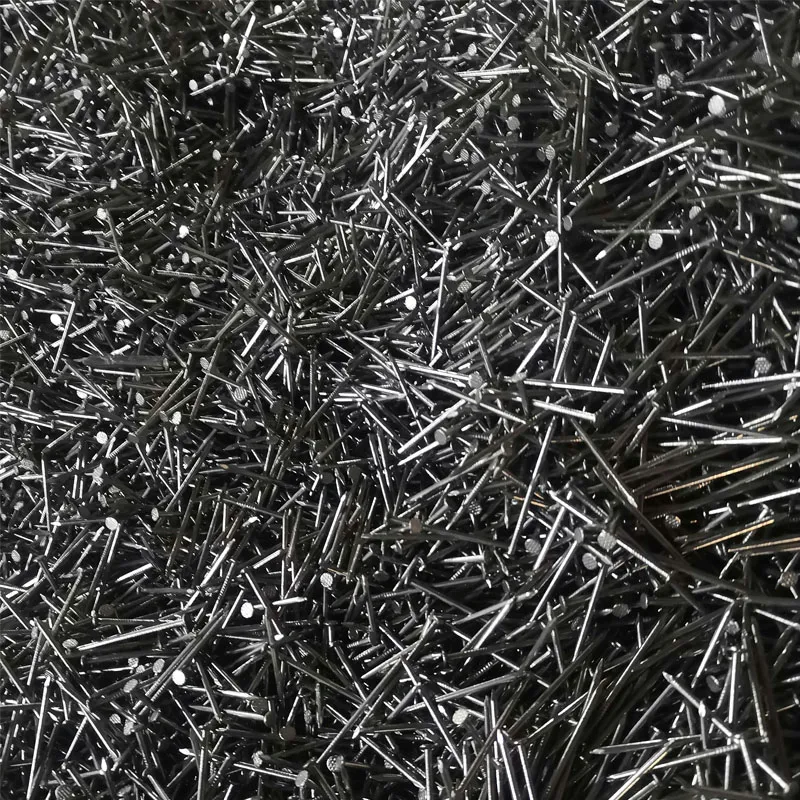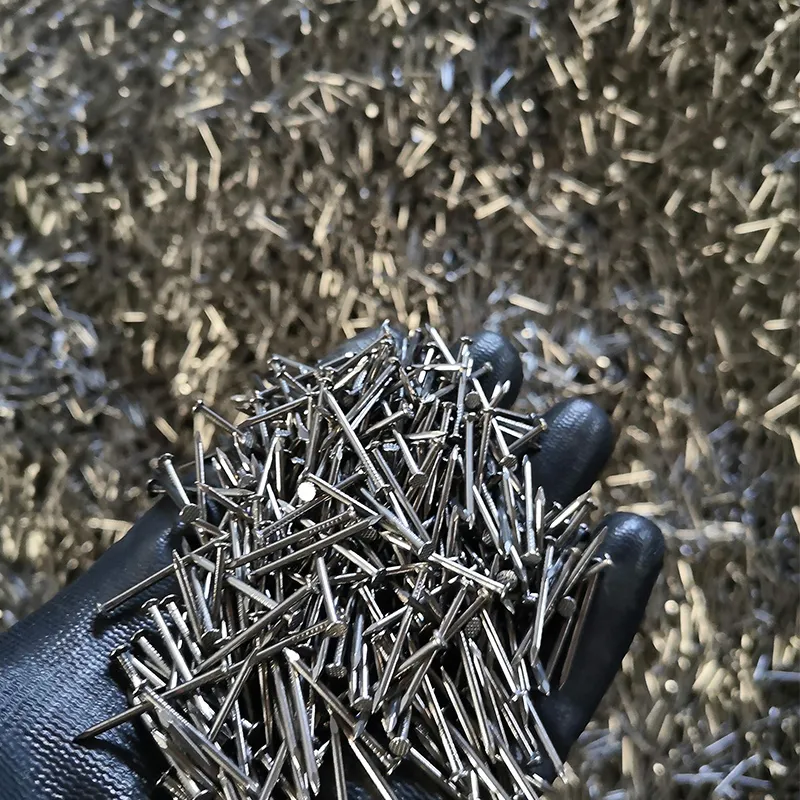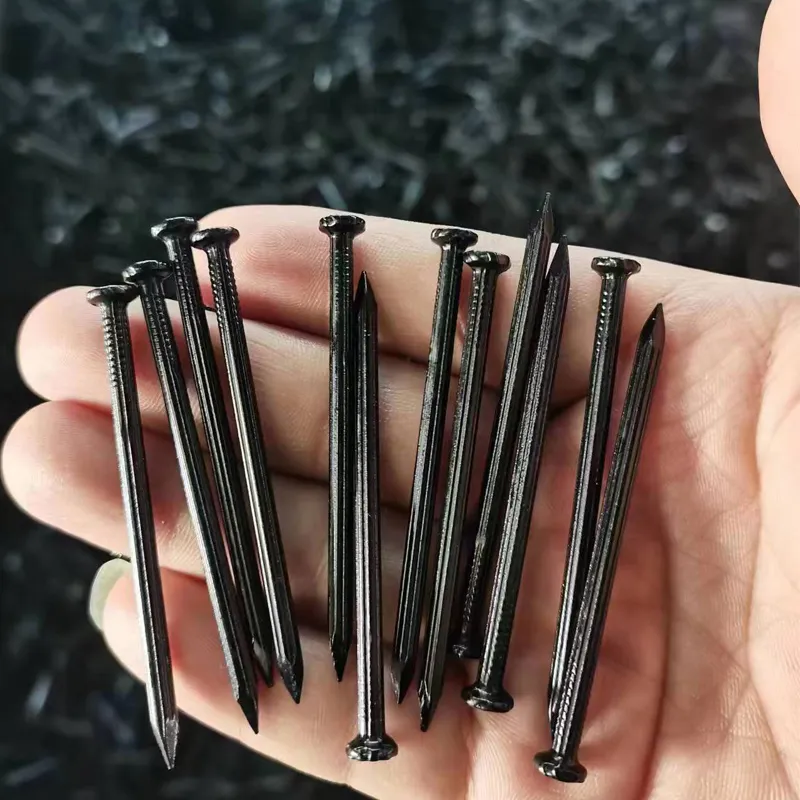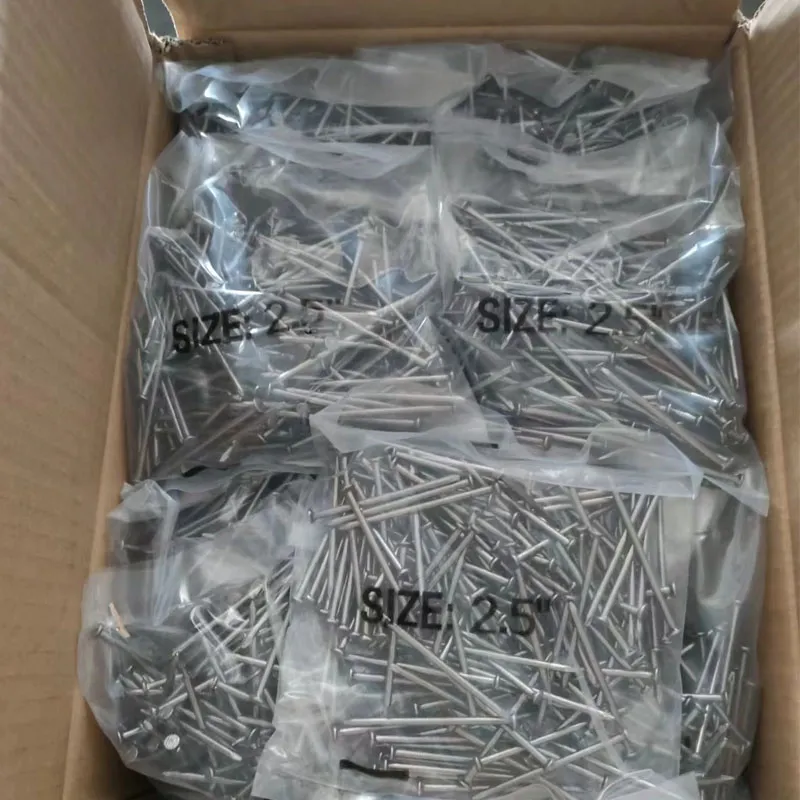Sep . 02, 2025 04:20 Back to list
Common Nail Factory: Reliable & High-Quality Construction Nails
Forging the Foundation: Understanding the Modern common nail factory Landscape
The construction industry's backbone relies heavily on fundamental components, and among these, the common nail stands as an indispensable fastener. A modern common nail factory represents a sophisticated interplay of material science, precision engineering, and streamlined production processes designed to meet the rigorous demands of global infrastructure. This detailed overview delves into the operational intricacies, technical merits, and strategic considerations involved in sourcing and utilizing common nails, essential for both construction nails and building nails applications.
Recent industry trends indicate a growing demand for higher-performance nails, driven by advancements in construction techniques, the proliferation of engineered wood products, and increasingly stringent building codes. Automation and digitalization are transforming traditional nail manufacturing, leading to enhanced quality control, improved production efficiency, and greater material utilization. Moreover, sustainability concerns are prompting factories to explore more eco-friendly materials and energy-efficient processes, marking a significant shift in the sector's operational paradigms.
The Precision Art of Nail Manufacturing: Process Flow
The manufacturing process within a common nail factory is a highly automated sequence that transforms raw steel wire into finished fasteners. This intricate flow ensures consistency, strength, and adherence to international standards. The primary materials typically include low carbon steel wire, ranging from SAE 1006 to SAE 1018, selected for its optimal balance of ductility and tensile strength. Specialized nails may incorporate stainless steel (e.g., 304, 316 for enhanced corrosion resistance) or galvanized wire.
Manufacturing Process Steps:
- Wire Drawing: Hot-rolled wire rods are cleaned (descaling) and then drawn through a series of dies, gradually reducing their diameter to the desired gauge. This process also work-hardens the wire, increasing its tensile strength.
- Nail Heading: The drawn wire is fed into high-speed nail-making machines. A gripping die holds the wire, while a heading tool strikes one end to form the nail head (e.g., flat, checkered, oval).
- Point Forming: Simultaneously, cutting dies shear the wire to the specified length and form the nail point (e.g., diamond, blunt, chisel). The waste material (slugs) is collected for recycling.
- Shank Formation (Optional): For specific applications, shanks may be ring-rolled or screw-threaded during or after heading for enhanced withdrawal resistance.
- Tumbling/Polishing: Nails are tumbled in large drums with sawdust or other polishing media to remove burrs, clean the surface, and give them a bright finish.
- Surface Treatment/Coating (Optional): Depending on the application, nails may undergo galvanization (hot-dip or electro-galvanized for corrosion resistance), vinyl coating (for easier driving and increased holding power), or cement coating.
- Quality Control & Packaging: Nails are inspected for dimensional accuracy, head formation, point sharpness, and surface defects. Automated counting and packaging systems then prepare them for shipment.

Testing Standards and Service Life:
Nails manufactured in a professional common nail factory adhere to stringent international standards, including ASTM F1667 for Driven Fasteners, ASTM F680 for Nails for Use with Wood, and various ISO standards (e.g., ISO 17161 for mechanical fasteners). These standards dictate material composition, dimensional tolerances, and mechanical properties such as tensile strength, shear strength, and bending resistance. Quality control tests often include bend tests, hardness tests, and dimensional checks to ensure product integrity.
The service life of common nails can span decades, typically exceeding 50-100 years, when installed correctly in appropriate conditions. For example, in a dry, interior timber framing application, a bright common nail can last indefinitely. For exterior or wet environments, galvanized or stainless steel nails are crucial to prevent corrosion, extending their functional life and maintaining structural integrity, demonstrating superior corrosion resistance and long-term reliability.
Target Industries and Application Advantages:
- Residential and Commercial Construction: Framing, sheathing, subflooring, roofing. Advantages include cost-effectiveness, high shear strength, and ease of use with traditional carpentry methods.
- Woodworking and Furniture Manufacturing: Assembling wood components. Offers strong, rigid joints.
- Packaging and Crating: Securing wooden crates and pallets. Provides robust fastening for heavy-duty shipping.
- Fencing and Landscaping: Attaching fence pickets, constructing garden structures. Galvanized options provide excellent corrosion resistance against outdoor elements.
Technical Specifications and Performance Metrics
Understanding the technical parameters of common nails is critical for engineers and procurement specialists to ensure optimal structural integrity and compliance. These specifications dictate suitability for various applications, directly impacting safety and durability. Below is a representative product specification table for common nails produced by a leading common nail factory, highlighting key performance indicators.

Typical Common Nail Product Specifications:
| Parameter | Description/Value Range | Standard Adherence |
|---|---|---|
| Material | Low Carbon Steel (e.g., SAE 1008, Q195) | ASTM A510, JIS G3505 |
| Sizes (Length) | 1 inch (25.4 mm) to 6 inches (152.4 mm) | ASTM F1667 (Table 1: Common Nail Dimensions) |
| Gauge (Diameter) | 15 gauge (1.83 mm) to 6 gauge (4.88 mm) | ANSI B18.1.1 |
| Head Type | Flat head, Round head, Checkered head | ASTM F1667 |
| Shank Type | Smooth, Annular Ring, Screw (Spiral) | ASTM F1667 |
| Point Type | Diamond point, Chisel point, Blunt point | ASTM F1667 |
| Finish | Bright, Electro-Galvanized, Hot-Dip Galvanized, Vinyl Coated | ASTM A153 (HDG), ASTM B633 (EG) |
| Tensile Strength | Min 55,000 psi (380 MPa) for steel wire | ASTM F1667 Annex A1 |
| Shear Strength | Dependent on diameter, generally exceeds wood shear capacity | N/A (Calculated from tensile properties) |
Note: Specific values may vary based on manufacturer, material grade, and exact product line. Always refer to the product datasheet for precise specifications.
Diverse Application Scenarios of Construction Nails
The versatility of common nails, particularly those optimized as construction nails and building nails, makes them indispensable across a spectrum of industries. Their fundamental role in creating robust, durable joints underpins the safety and longevity of structures globally. From heavy-duty framing to intricate finishing work, the selection of the correct nail type and specification from a reliable common nail factory is paramount.
Primary Application Domains:
- Structural Framing: In residential and commercial buildings, large common nails (e.g., 16d, 20d) are used for fastening studs, joists, and rafters. Their high shear strength ensures the structural integrity of the timber framework, resisting lateral forces and supporting significant loads.
- Subflooring and Sheathing: Ring-shank nails or common nails are employed to secure plywood or OSB panels to floor joists and wall studs. The annular rings provide superior withdrawal resistance, minimizing floor squeaks and enhancing the rigidity of the building envelope.
- Roofing Applications: Galvanized roofing nails, often with larger heads, are specifically designed to secure asphalt shingles, underlayment, and roof sheathing. Their corrosion resistance is vital for long-term exposure to weather elements.
- Exterior Siding and Trim: Smaller gauge, galvanized common nails or siding nails are used for attaching various types of siding (e.g., wood, fiber cement) and exterior trim. The choice of finish is crucial to prevent staining and degradation from moisture.
- Decking and Fencing: Hot-dip galvanized common nails are preferred for outdoor structures like decks, pergolas, and fences due to their exceptional protection against rust and corrosion in damp environments.
- Formwork and Temporary Structures: Common nails are frequently used in the assembly of concrete formwork due to their ease of driving and sufficient holding power for temporary applications. Their cost-effectiveness makes them ideal for single-use or reusable form construction.

The selection process for building nails should always consider the specific load requirements, environmental exposure, and material compatibility to ensure that the fastener performs as intended for the entire design life of the structure. High-quality nails from a reputable manufacturer provide the confidence needed for critical structural applications.
Technical Advantages and Vendor Comparison
The competitive landscape for common nail factory operations is characterized by continuous innovation in material science and manufacturing efficiency. Key technical advantages offered by leading manufacturers include superior material grades, precision engineering, and advanced surface treatments, which collectively contribute to enhanced fastener performance. These elements are crucial for professional buyers and project managers evaluating suppliers.
Key Technical Advantages:
- Optimized Steel Composition: Utilization of specific low-carbon steel alloys (e.g., Q195, Q235) with controlled chemical properties to achieve the ideal balance of strength, ductility, and formability, preventing brittleness or excessive bending during driving.
- Consistent Dimensional Accuracy: Advanced CNC-controlled nail-making machines ensure precise length, diameter, head size, and point sharpness, which translates to fewer bent nails, easier driving, and reliable connections.
- Superior Surface Finishes: Hot-dip galvanization provides a thick, metallurgically bonded zinc coating offering excellent corrosion protection, often exceeding 50 years in mild outdoor exposure. Electro-galvanization offers a brighter finish for less severe environments. Vinyl coatings reduce friction during driving and increase withdrawal resistance.
- Enhanced Holding Power: The design of annular ring shanks and screw shanks significantly boosts withdrawal resistance compared to smooth shanks, crucial for preventing uplift and ensuring long-term structural integrity in applications like subflooring or decking.
- Robust Quality Assurance: Factories employing ISO 9001 certified quality management systems perform continuous in-process checks and post-production testing (e.g., bend tests, shear tests, coating thickness measurements) to guarantee product reliability and compliance with ASTM/EN standards.
Vendor Comparison: Evaluating a Common Nail Factory
Selecting the right supplier from the numerous common nail factories requires a holistic evaluation beyond just price. Factors such as production capacity, quality certifications, customization capabilities, and after-sales support are paramount.
| Criterion | Leading Common Nail Factory (e.g., Yiszhe Wire Mesh) | Standard Supplier |
|---|---|---|
| Production Capacity | High-volume, automated lines (e.g., 2000+ tons/month) | Moderate volume (e.g., 500-1000 tons/month) |
| Quality Certifications | ISO 9001:2015, ASTM, CE (for specific products) | Basic quality checks, local standards |
| Material Traceability | Full traceability from wire rod to finished product | Limited or batch-level traceability |
| Customization Options | Extensive (material, size, coating, packaging, branding) | Limited to standard variations |
| Lead Time | Efficient, often 10-20 days for standard orders | Variable, 20-45 days |
| Technical Support | Dedicated engineering support, application guidance | Basic sales support |
| Environmental Compliance | Adherence to local/international environmental regulations, waste reduction | Basic compliance |
Customized Solutions from a Leading Common Nail Factory
In the complex world of B2B procurement for construction and industrial applications, off-the-shelf solutions do not always suffice. A truly responsive common nail factory understands this and offers comprehensive customization services to meet unique project requirements. This extends beyond simple variations to encompass specialized material, design, and packaging innovations.
Areas of Customization:
- Material Specification: Beyond standard low-carbon steel, custom orders can specify higher carbon steels for increased hardness, stainless steel grades (e.g., 304, 316) for extreme corrosion resistance in marine or chemical environments, or even copper/brass for aesthetic or specific conductivity requirements.
- Dimensional Adjustments: Precise tailoring of nail length, diameter (gauge), and head size to fit non-standard lumber dimensions, specific panel thicknesses, or automated nailing equipment requirements.
- Shank and Point Geometry: Development of custom shank patterns (e.g., deeper annular rings, unique spiral threads) for enhanced pull-out resistance in specific wood species or composite materials. Specialized point designs (e.g., self-piercing points for hard materials, blunt points to prevent splitting) can also be engineered.
- Advanced Coatings: Application of specialized coatings such as polymer-based anti-corrosion layers, colored coatings for aesthetic matching, or heat-resistant finishes for high-temperature applications. This is crucial for environments where standard galvanization might not suffice.
- Branding and Packaging: Custom packaging solutions, including specific box sizes, weight configurations, private labeling, and branding. This streamlines logistics and enhances brand recognition for distributors.
- Collated Nail Formats: Custom collation for pneumatic nailers, including plastic, paper, or wire strip collation in specific angles and counts, ensures compatibility with diverse fastening tools.
Partnering with a common nail factory that offers robust customization capabilities provides a distinct competitive advantage, ensuring that fasteners are perfectly matched to the application, optimizing performance, and reducing project costs associated with unsuitable materials.
Application Case Studies: Building Confidence with Common Nails
Real-world application case studies demonstrate the reliability and effectiveness of common nails produced by a leading common nail factory. These examples highlight how tailored solutions and adherence to stringent quality standards contribute to successful project outcomes.
Case Study 1: Large-Scale Residential Development – "Harmony Heights"
Project Scope: Construction of 500 single-family homes in a high-density urban fringe area, requiring over 10 million common nails for framing, subflooring, and sheathing.
Challenge: Maintain rapid construction schedules while ensuring structural integrity and minimizing material waste. The climate presented moderate humidity, requiring robust fastening for long-term stability.
Solution: Our factory supplied ASTM F1667 compliant 10d and 16d common nails (bright finish for interior framing, electro-galvanized for exterior sheathing). We implemented a just-in-time delivery schedule to the construction site, managing logistics for high-volume orders. For subflooring, 8d ring-shank nails were used to prevent floor squeaks and enhance withdrawal resistance, meeting strict building code requirements for sound attenuation and structural rigidity.
Outcome: The project was completed on schedule and within budget. Customer feedback highlighted the consistent quality of the nails, minimizing bent fasteners and enhancing worker productivity. The superior holding power of the ring-shank nails significantly reduced call-backs related to subfloor performance.
Case Study 2: Coastal Resort Redevelopment – "Ocean Vista"
Project Scope: Redevelopment of a luxury coastal resort, involving extensive outdoor decking, pergolas, and structural elements exposed to salt air and high humidity.
Challenge: Extreme corrosion due to proximity to the ocean and the need for fasteners that could withstand harsh environmental conditions without degradation or unsightly rust stains on premium lumber.
Solution: We provided custom-ordered hot-dip galvanized common nails (HDG compliant with ASTM A153) and stainless steel nails (316 grade) for specific high-exposure areas. The HDG nails were specifically chosen for their thick zinc coating, providing cathodic protection against galvanic corrosion. For the decking, ring-shank HDG nails were utilized to ensure maximum withdrawal resistance against potential wood warping and expansion/contraction from moisture fluctuations.
Outcome: Two years post-completion, the fasteners show no signs of corrosion, preserving the aesthetic and structural integrity of the resort. The client praised the proactive material recommendations and the long-term performance, significantly reducing maintenance costs compared to previous projects that used less resistant fasteners.

Trust and Reliability: FAQ, Lead Time, Warranty & Support
At the core of any successful B2B partnership is trust, built on transparency, reliability, and robust support infrastructure. A dedicated common nail factory prioritizes these elements to ensure seamless procurement and post-purchase satisfaction.
Frequently Asked Questions (FAQ):
-
Q: What is the minimum order quantity (MOQ) for common nails?
A: Our standard MOQ for common nails is typically 5-10 metric tons, depending on the specific size and finish. Custom orders may have different MOQs, which can be discussed with our sales team. -
Q: How do you ensure product quality and consistency?
A: We operate under ISO 9001 certified quality management systems. This includes raw material inspection, in-process quality checks (dimensional accuracy, head formation), and final product testing (bend tests, tensile strength, coating thickness) conducted by our dedicated QC department. -
Q: Can you provide third-party inspection reports for your common nails?
A: Yes, we regularly work with reputable third-party inspection agencies (e.g., SGS, Bureau Veritas) and can arrange for product verification and certification at the client's expense, ensuring compliance with specific project requirements. -
Q: What is the difference between electro-galvanized and hot-dip galvanized nails?
A: Electro-galvanized (EG) nails have a thinner zinc coating, offering moderate corrosion resistance suitable for interior or protected exterior use. Hot-dip galvanized (HDG) nails have a much thicker, more durable zinc coating, providing superior corrosion resistance essential for severe outdoor or marine environments.
Lead Time & Fulfillment Details:
Our efficient production lines and robust supply chain management allow for competitive lead times. For standard common nail orders, expect a lead time of 10-20 business days from order confirmation to shipment. For custom specifications or large-volume projects, lead times will be provided upon detailed inquiry and negotiation, ensuring a transparent fulfillment process tailored to project timelines.
Warranty Commitments:
We stand behind the quality of our common nails. All products manufactured by our common nail factory are covered by a structural integrity warranty for a period of 10 years from the date of purchase, against defects in material and workmanship when used under normal conditions and in accordance with applicable building codes and installation guidelines. Specific coatings, such as hot-dip galvanization, carry additional performance guarantees related to corrosion resistance, typically aligned with industry standards for service life in given exposure categories.
Customer Support Information:
Our dedicated customer support team is available to assist with all inquiries, from technical specifications and order placement to logistics and after-sales service. We offer multi-channel support including:
- Email: sales@yiszhewiremesh.com
- Phone: +86-123-4567-890 (International sales line)
- Online Inquiry Form: Available on our official website for detailed requests.
Our technical experts are available for consultations to ensure you select the most appropriate fasteners for your specific projects, providing unparalleled B2B service.
References:
- American Society for Testing and Materials (ASTM). "ASTM F1667 - Standard Specification for Driven Fasteners: Nails, Spikes, and Staples." ASTM International.
- International Organization for Standardization (ISO). "ISO 9001:2015 - Quality management systems — Requirements." ISO.
- National Institute of Standards and Technology (NIST). "Mechanical Properties of Fasteners." NIST Engineering Laboratory.
- U.S. Department of Agriculture, Forest Service, Forest Products Laboratory. "Wood Handbook—Wood as an Engineering Material." General Technical Report FPL–GTR–190.
-
Pre Cut Wire - Straightened, Deburred, Custom Lengths
NewsNov.17,2025
-
Binding Wire for Sale - Durable, Rust-Resistant, Bulk Deals
NewsNov.17,2025
-
Field Fencing for Horses – Safe, Durable, Easy Install
NewsNov.17,2025
-
Euro Fence Factory: Durable, Custom Euro Style Fences
NewsNov.17,2025
-
Euro Fence Factory: Durable OEM Panels, Direct Pricing
NewsNov.17,2025
-
Chain Link Fence Suppliers | Galvanized, Factory-Direct
NewsNov.11,2025









